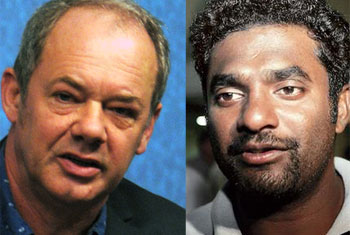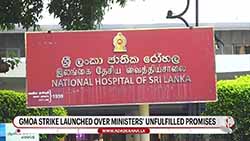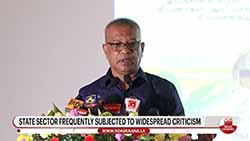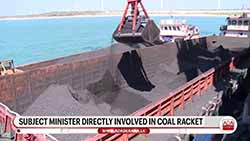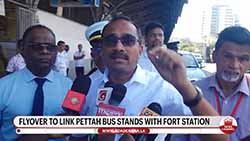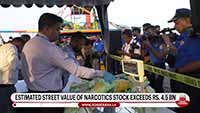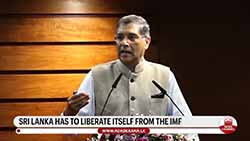Macrae visits Murali
November 16, 2013 01:52 pm
Channel 4’s Callum Macrae today visited Sri Lankan cricket legend Muttiah Muralitharan to discuss his charity work and other development activities in the war-affected Northern region.
Ada Derana has learnt that Macrae and his crew visited the spin bowling great at his residence in Battaramulla to talk about the sportsman’s initiative to bring together youngsters from Tamil and other communities through cricket as part of post-war reconciliation efforts.
They have also discussed various other development activities taking place Northern Province as well as topics concerning cricket and rehabilitation.
Macrae, Director of controversial documentary ‘No Fire Zone’ , is currently in Sri Lanka to cover the ongoing Commonwealth Heads of Government Meeting (CHOGM).
Muralitharan had also met the British Prime Minister, David Cameron this morning at a cricket ground in Colombo.
Murali had reportedly suggested the Prime Minister had been “misled” about the latest situation in the war-scarred north of the island.
But asked about the politician’s calls for more action from the government of Mr Rajapaksa - which has been criticised internationally over human rights abuses - Muralitharan, a Tamil, said Mr Cameron was underestimating the improvements already made.
“I’m a sportsman and we don’t think about politics,” he told reporters.
“My opinion is, there were problems in the last 30 years in those areas. Nobody could move there. In wartime I went with the UN, I saw the place, how it was.
“Now I regularly go and I see the place and it is about a 1,000% improvement in facilities.
“Cricket is the main game to narrow the bridge between the people. But facilities-wise, schools are built, roads are built. Businesses are started. So many things have happened. It is improving.
“Thanks to the Sri Lankan army, they are putting a lot of effort there.
“This country is 20-odd million people. In the north there are only one million people. They are getting more attention than the south at the moment.”
Asked about Mr Cameron’s stance, Muralitharan said: “He must have been misled by other people.
“People speak without going and seeing the things there. I go on and off. I see from my eyes there is improvement.
“I can’t say the Prime Minister is wrong or not. He’s from England, he hasn’t seen the site, he hasn’t gone and visited these places - yesterday only.
“But other than that, the political side ... basically what we want is food, shelter, education, happiness in the family.”
Mr Cameron said it was an “enormous pleasure” to meet the bowler - who took a record 800 Test wickets.
Asked about Muralitharan’s comments at a press conference, the Prime Minister said: “I think he acknowledged that I was right to come and right to visit.
“Of course I was told all sorts of things yesterday in the north and there are very strong views in this country, strong differing views on some of the issues.
“I would say what matters is not everything I was told but what I myself have said, and I think I’ve given a fair reflection of some of the things that need to happen in terms of reconciliation, in terms of progress, in terms of human rights, free speech, and I think it’s important to raise these issues.”
Ada Derana has learnt that Macrae and his crew visited the spin bowling great at his residence in Battaramulla to talk about the sportsman’s initiative to bring together youngsters from Tamil and other communities through cricket as part of post-war reconciliation efforts.
They have also discussed various other development activities taking place Northern Province as well as topics concerning cricket and rehabilitation.
Macrae, Director of controversial documentary ‘No Fire Zone’ , is currently in Sri Lanka to cover the ongoing Commonwealth Heads of Government Meeting (CHOGM).
Muralitharan had also met the British Prime Minister, David Cameron this morning at a cricket ground in Colombo.
Murali had reportedly suggested the Prime Minister had been “misled” about the latest situation in the war-scarred north of the island.
But asked about the politician’s calls for more action from the government of Mr Rajapaksa - which has been criticised internationally over human rights abuses - Muralitharan, a Tamil, said Mr Cameron was underestimating the improvements already made.
“I’m a sportsman and we don’t think about politics,” he told reporters.
“My opinion is, there were problems in the last 30 years in those areas. Nobody could move there. In wartime I went with the UN, I saw the place, how it was.
“Now I regularly go and I see the place and it is about a 1,000% improvement in facilities.
“Cricket is the main game to narrow the bridge between the people. But facilities-wise, schools are built, roads are built. Businesses are started. So many things have happened. It is improving.
“Thanks to the Sri Lankan army, they are putting a lot of effort there.
“This country is 20-odd million people. In the north there are only one million people. They are getting more attention than the south at the moment.”
Asked about Mr Cameron’s stance, Muralitharan said: “He must have been misled by other people.
“People speak without going and seeing the things there. I go on and off. I see from my eyes there is improvement.
“I can’t say the Prime Minister is wrong or not. He’s from England, he hasn’t seen the site, he hasn’t gone and visited these places - yesterday only.
“But other than that, the political side ... basically what we want is food, shelter, education, happiness in the family.”
Mr Cameron said it was an “enormous pleasure” to meet the bowler - who took a record 800 Test wickets.
Asked about Muralitharan’s comments at a press conference, the Prime Minister said: “I think he acknowledged that I was right to come and right to visit.
“Of course I was told all sorts of things yesterday in the north and there are very strong views in this country, strong differing views on some of the issues.
“I would say what matters is not everything I was told but what I myself have said, and I think I’ve given a fair reflection of some of the things that need to happen in terms of reconciliation, in terms of progress, in terms of human rights, free speech, and I think it’s important to raise these issues.”



